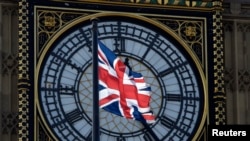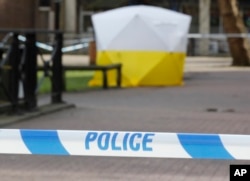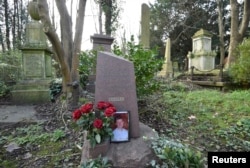Saying Britain is being "pushed around" by the Kremlin, Britain's defense secretary has joined a chorus in London calling for retaliation against Russia, as a former Russian double agent and his daughter fight for their lives after being struck down by a toxic substance.
Gavin Williamson's remarks came as British police revealed that as many as 21 people were treated for possible nerve agent poisoning in the apparent attempted assassination March 4 of Sergei Skripal, who was recruited by Britain’s MI6 intelligence agency, and his 33-year-old daughter, Yulia.
Father and daughter remain hospitalized in critical condition and both reportedly are in comas after being found unconscious on a bench outside a shopping mall in the town of Salisbury.
“Russia’s being assertive, and we have to change the way that we deal with it because we can’t be in a situation in these areas of conflict where we are being pushed around by another nation,” said Williamson.
His comments contrasted with colleagues in Prime Minister Theresa May's Cabinet. They have either hedged their blaming of the Kremlin for the attempted assassination, or urged lawmakers to suspend judgment and allow the police investigation, which is being led by counter-terror officers, to run its course without conjecture.
Russian officials deny the Kremlin had anything to do with the assassination attempt, dubbing British allegations as hysterical and wild.
Theresa May and Britain’s foreign secretary, Boris Johnson, have promised that Britain’s response will be “robust” once the perpetrators have been identified.
Fanning the flames
The prime minister’s efforts to restrain a rush to judgment aren’t being helped by Russian state television's coverage, which is often used as a mouthpiece for the Kremlin. It appears eager to fan the political flames in London with a top presenter, Kirill Kleymenov, gloating that “traitors” shouldn’t think they are safe living in Britain. “The profession of traitor is a lot more dangerous than that of a drug courier. It is very rare that those who choose it live out their days in peace and serenity,” he said.
And he cautioned on Russian Channel One’s flagship news show, “Whatever the reasons, whether you’re a professional traitor to the motherland or you just hate your country in your free time, I repeat, no matter, don’t go to England.”
British government critics worry it will be difficult, if not impossible, to establish "hard evidence" that the Kremlin was behind the first-ever nerve agent attack on British soil. Russian President Vladimir Putin “has developed deniability into an art form,” said Fraser Nelson, editor of Britain’s Spectator magazine, in a column Friday.
“From the soldiers sent into Crimea in unmarked uniforms to the supposedly independent computer hackers who menace Estonia, it is often impossible to say with certainty that the Kremlin is involved. So there is the perfect excuse for Britain to do nothing, and pretend it hasn’t seen anything,” he added.
Two years ago, a public inquiry in London concluded there was a “strong probability” Russia’s security service, the FSB, was behind the fatal 2006 poisoning of Alexander Litvinenko, a dissident and Russian KGB officer-turned-British intelligence agent. He died agonizingly slowly after drinking tea at a London hotel that was laced with radioactive polonium-210. Government critics argue Britain pulled its punch in retaliation for that incident, which included the summoning of the Russian ambassador for a telling-off and the freezing of assets of the two main suspects.
Emboldening Moscow
Bill Browder, a financier who has campaigned to expose high-level corruption in Russia, told British lawmakers this week that the “inadequate” response to Litvinenko’s assassination likely emboldened Moscow. He said the poisoning of the Skripals should in the first instance be treated as a Kremlin-backed plot.
He called for a much tougher crackdown on Putin-connected oligarchs. “The Achilles heel of the Putin regime is to go after Putin-connected oligarchs in the UK by seizing their assets,” he argued. He told a British parliamentary panel approximately $800 billion worth of Russian state-backed assets, mostly real estate, are held outside Russia and could be targeted. About $300 billion in cash and assets are estimated to be in the United States.
According to Transparency International, a Berlin-based anti-corruption lobbying and research organization, large amounts of the Russian state-backed money controlled by Putin-connected oligarchs flow through British Crown dependencies and British overseas territories in the Caribbean and then is transferred to the British capital.
“London has certain advantages and Russians have always found London particularly attractive,” according to Robert Barrington of Transparency International. “It has these historic links with the Crown dependencies and overseas territories, so it is very easy to be part of that global laundering system. It is also a huge market in itself, so if you want to hide dirty money, it is easier to do,” he says.
Reaping profits
Anti-corruption campaigners say there was a huge jump in Russian money flowing into London after the 2008 financial crash, partly because Britain courted foreign money and offered easy-to-get investor visas with few questions being asked. An estimated 500 Russian multimillionaires live in Britain.
Their cash has driven up real estate prices and helped fuel the profits of expensive private schools and exclusive shops as well as providing a large share of the incomes of British bankers, fund managers, lawyers and PR executives. More than 10,000 properties in Westminster, a central London borough, are owned by anonymous companies; some are thought to be Chinese or Gulf Arab in origin, but many are Russian.
Earlier this year, British government ministers announced they intended to target rich Russians in Britain who couldn’t prove where their money came from, and they announced new asset-seizure powers known as unexplained wealth orders. Critics say as a further step, the government needs to insist Caribbean tax havens clean up their act and introduce rigorous transparency rules.
The call for oligarchs’ assets to be seized and for heightened monitoring and even blocking of Russian cash flows into London comes at a bad time for the British capital. London’s financial services industry, which accounts for a significant portion of Britain's GDP, could lose as much as 25 percent of its business when Britain exits the European Union and British bankers and investment managers hope to make up the difference by being even more attractive for foreign investors and the wealthy. Brexiters have been calling for greater deregulation of the city of London.
British officials say they are consulting with their U.S. and European counterparts to discuss a coordinated response, if the Kremlin is found to have been involved in the assassination attempt. This year’s World Cup competition being hosted by Russia is likely to be a target for some kind of boycott, say officials.







